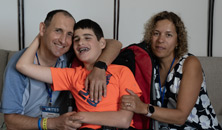 Mark Zylka, PhD UNC Chapel Hill
Mark Zylka, PhD UNC Chapel Hill Validation of therapeutic guide RNAs targeting the UBE3A antisense transcript
Summary of Dr. Zylka Study
Dr. Zylka’s lab and others have been exploring the possibility that symptoms associated with Angelman syndrome (AS) can be treated by unsilencing the paternal copy of Ube3a. Dr. Zylka’s lab recently found that paternal Ube3a can be unsilenced in neurons by topoisomerase inhibitors, a drug compound, which work by interfering with expression of the extremely long Ube3a‐ATS transcript. In addition, AS research in other labs found that targeting the Ube3a‐ATS with antisense oligonucleotides (ASOs) can also unsilence paternal Ube3a. While both of these approaches have advantages and disadvantages, neither approach has yet been shown to work in individuals with AS. With the advent of CRISPR/Cas9 technology, it is now possible to achieve targeted and permanent deletion of the Ube3a‐ATS in neurons. However, we still do not have a full understanding of which regulatory elements control Ube3a‐ATS expression and function.
Dr. Zylka will complete a screening a library of guide RNAs (gRNAs) to identify regions in the Ube3a‐ATS that could serve as therapeutic targets in unsilencing paternal UBE3a. Then using mouse models, attempt to unsilence Ube3a using Adeno‐Associated Virus (AAV) particles and rescue AS‐linked behaviors in AS model mice. The ultimate goal of the study is to identify therapeutic gRNAs that permanently unsilence Ube3a‐ATS, and serve as the foundation for a gene therapy for AS.





